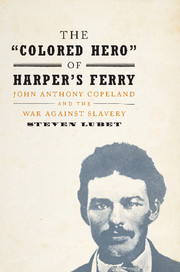Book contents
- Frontmatter
- Dedication
- Contents
- Acknowledgments
- Author's Note
- Prologue
- 1 The Frozen River
- 2 A Good Abolition Convention
- 3 The Colony and the College
- 4 “A Most Well Disposed Boy”
- 5 “I Have Found Paradise”
- 6 “My Object in Coming to Oberlin”
- 7 Not a Fugitive Was Seized
- 8 The New Marshal
- 9 “Recital of the Wrong and Outrage”
- 10 Wack's Tavern
- 11 A Brace of Pistols
- 12 The Oberlin Rescue
- 13 “The Black Mecca”
- 14 The Felons' Feast
- 15 Votaries of the Higher Law
- 16 “The Bravest Negroes”
- 17 The Invisibles
- 18 The War Department
- 19 Hall's Rifle Works
- 20 “His Negro Confession”
- 21 Nothing Like a Fair Trial
- 22 An Abolition Harangue
- 23 Only Slave Stealing
- 24 This Guilty Land
- 25 The Colored American Heroes
- Epilogue
- Notes
- Bibliography
- Index
17 - The Invisibles
Published online by Cambridge University Press: 05 July 2015
- Frontmatter
- Dedication
- Contents
- Acknowledgments
- Author's Note
- Prologue
- 1 The Frozen River
- 2 A Good Abolition Convention
- 3 The Colony and the College
- 4 “A Most Well Disposed Boy”
- 5 “I Have Found Paradise”
- 6 “My Object in Coming to Oberlin”
- 7 Not a Fugitive Was Seized
- 8 The New Marshal
- 9 “Recital of the Wrong and Outrage”
- 10 Wack's Tavern
- 11 A Brace of Pistols
- 12 The Oberlin Rescue
- 13 “The Black Mecca”
- 14 The Felons' Feast
- 15 Votaries of the Higher Law
- 16 “The Bravest Negroes”
- 17 The Invisibles
- 18 The War Department
- 19 Hall's Rifle Works
- 20 “His Negro Confession”
- 21 Nothing Like a Fair Trial
- 22 An Abolition Harangue
- 23 Only Slave Stealing
- 24 This Guilty Land
- 25 The Colored American Heroes
- Epilogue
- Notes
- Bibliography
- Index
Summary
ON A SINGLE SUMMER AFTERNOON IN Oberlin, John Brown, Jr., had enlisted more black volunteers than his father was able to attract on any other occasion during the entire eighteen months that he was actively seeking troops for the Harper's Ferry operation. For the most part, the elder Brown failed badly in his efforts to recruit African-Americans. Both Harriet Tubman and Frederick Douglass declined to join him, and only one of the thirty-four black signatories of the Chatham Constitution eventually showed up at Harper's Ferry. Even Richard Richardson, a runaway slave who had joined Brown in Kansas and had participated in the Missouri rescue, remained in Canada rather than participate in the invasion of Virginia.
Brown had figured heavily on the availability of black troops, depending on them to inspire local slaves to join his rebellion. As he proposed to Frederick Douglass, Brown had a “special purpose” in mind for his black comrades. “When I strike, the bees will begin to swarm, and I shall want you to help hive them.” Douglass demurred, later explaining that either “my discretion or my cowardice made me proof against the dear old man's eloquence.” But even without Douglass or another famous African-American, Brown was hopeful that ordinary black foot soldiers would guide an anticipated “swarm” of slaves to his emancipatory banner. Apart from Copeland and Leary, however, there would be only three blacks in Brown's small army.
Why was the younger Brown so much more successful than his father at enrolling black men in their cause? Why did Copeland and Leary respond so readily when so many others equivocated or balked? Of course, we can only speculate – although we can surely assume that it was not a matter of superior persuasiveness, given the old man's renowned eloquence and charisma – but some tentative answers do suggest themselves. Oberlin, as we know, was a unique environment in the ante- bellum United States, combining an ideology of racial egalitarianism with an exceptional reverence for the rescue of slaves.
- Type
- Chapter
- Information
- The 'Colored Hero' of Harper's FerryJohn Anthony Copeland and the War against Slavery, pp. 134 - 143Publisher: Cambridge University PressPrint publication year: 2015



